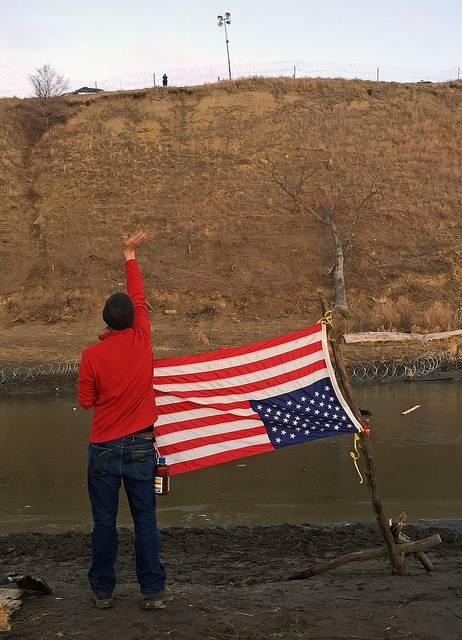
A U.S. District Court has been reviewing arguments concerning the legality of the Dakota Access Pipeline route since it was green-lighted by incoming President Donald Trump. But pipeline critics suffered a major blow last week when the district judge refused a request for a temporary restraining order. The request was filed by the Cheyenne River Sioux, a joint plaintiff in the Standing Rock Sioux's legal challenge against the pipeline.
They maintain that the ongoing construction of the DAPL infrastructure on either side and under Lake Oahe will "desecrate the waters upon which Cheyenne River Sioux tribal members rely for their most important religious practices and therefore substantially burden the free exercise of their religion." The plaintiffs cited irreparable harm if the pipeline were to proceed.
But Judge James E. Boasberg of the U.S. District Court of Washington, D.C. disagreed. He said the ruling wasn't about whether the pipeline "was a good or a bad idea," but whether the construction would cause "imminent harm." The court will meet again at the end of February to hear further testimony. For now, Boasberg said there is insufficient evidence that the construction of the empty section of pipeline under Lake Oahe would pose a risk to either the tribe's drinking water or cultural sites.
Any immediate risk to the tribe "would come when the spigot is turned on and the oil flows through the pipeline," Boasberg said.
This is the latest setback for North Dakota's Standing Rock Sioux and its water protectors, who say the pipeline will put their livelihood and their way of life at risk. The Cheyenne River tribe also alleges that the easement granted by the U.S. Army Corps of Engineers is "entirely unlawful" under the Religious Freedom Restoration Act.
“The government has granted the easement, and Dakota Access has begun to drill. This court cannot wait until the harm begins to issue equitable relief. When the free exercise of religion is at stake, a threat certain to that right is enough to constitute irreparable harm," the tribe stated in submitted documents.
Lawyers for the pipeline's developer, Energy Transfer Partners, call the stay request under the RFRA "exceedingly tardy" and a "last-minute tactic." They also insisted that the reasons for the request were "not construction related."
But Christina Sterbenz of Vice News suggests that authorizing the pipeline without completing the Environmental Impact Statement the Army Corps stared on Jan. 18 may have been illegal.
An expert familiar with laws pertaining to environmental impact statements told Sterbenz that when the president ordered the go-ahead for the pipeline and the Corps cancelled the impact report, it opened the government to a potential lawsuit.
“That may work when you’re on 'The Apprentice,'" said Zygmunt Plater, a professor of environmental law at Boston College. "But when you’re in court, the allegations will be that the decision was originally based on fact and has been changed not on fact.”
And that may be the Standing Rock Sioux's next move. Jan Hasselman, counsel for the Standing Rock Sioux tribe, maintains that while he has the power to write executive orders, "The president doesn't have the power to change the law."
Parties to the ongoing debate are scheduled to meet in court again on Feb. 27
Image credits: 1) Flickr/Argyleist; 2) Flickr/Becker1999
Jan Lee is a former news editor and award-winning editorial writer whose non-fiction and fiction have been published in the U.S., Canada, Mexico, the U.K. and Australia. Her articles and posts can be found on TriplePundit, JustMeans, and her blog, The Multicultural Jew, as well as other publications. She currently splits her residence between the city of Vancouver, British Columbia and the rural farmlands of Idaho.














